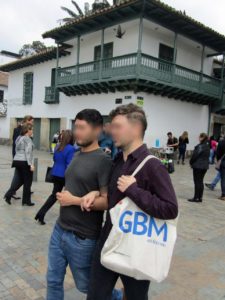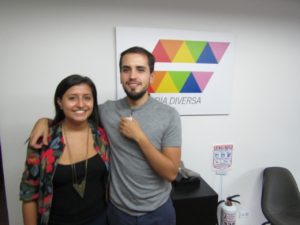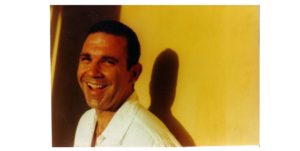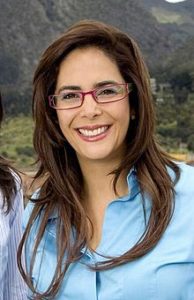By Richard Ammon
GlobalGayz.com
March 2018
Despite the approval of gay marriage and adoption rights for gays, Colombia is not yet the place where gay couples show affection in public. That said, I saw two moments of public touching during my visit, in separate cities on separate days. Two couples, one holding hands, (photo below) the other sitting close on a park bench.
Given Colombia’s history, it’s strong religious and machismo roots and its place among Catholic neighbors in South America, it more accurately can be said to be ‘somewhat’ more progressive than its neighbors. “In large cities like Bogota and Medellin and Cartegena Gay pride celebrations and protests are mounted so the LGBT community has an active and visible but small voice.” An active voice, but is anyone paying due attention? Mostly not the masses so that’s why activists focus on the judiciary to get their agenda heard. “That proved to be a wise move. The Constitutional Court eventually ruled in favor of the gay rights issues on various occasions…” The first victory came in February 2007 when gay couples finally won property and inheritance rights previously reserved for non-married heterosexual couples. Now there was no need to go to any notary public for documents. Inheritance is automatic after two years of living together.
Later that year, social security benefits were authorized for same-sex couples and in 2008 the Court ruled in favor of partnership pension benefits. In January 2009, another decision came from the Court, granting same-sex couples more than 42 additional rights, such as visas for same-sex spouses. Then in 2016 gay marriage was approved by the Supreme Court, mandated by a legal decision since a popular plebiscite was not likely in the current culture. For many in the gay community these rights were acceptable and sufficient. Non-married heterosexual and homosexual couples would be treated practically the same under the law. The right of marriage also provided gay couples with the right to jointly adopt children.
(Source for the above quotations: http://www.colombia-diversa.org/p/in-english.html; https://thecitypaperbogota.com/news/colombia-says-yes-to-gay-marriage/10653)
Empowered LGBTs
That’s why public Gay Pride is important here, to be heard as well as seen. Cartagena is host to Colombia’s largest gay party called Rumors Festival held once a year. Medellin has a noisy colorful Pride event. These are not just colorful parades. They are urgent reminders to the Catholic hetero-macho majority not to forget the small minority of LGBT citizens who are often overlooked and scorned. Everyone is supposed to be equal under the law but legal rulings don’t always transfer to social attitudes. So homophobia continues and Pride parades become more assertive and flamboyant, as if to say ‘you cannot avoid us’.
(http://www.twobadtourists.com/2017/03/03/this-south-american-country-might-be-the-newest-emerging-gay-destination/)
In Bogota there is a huge anomaly to the usual homophobic social milieu. It’s called Theatron. It’s way over the top as a social gay-mixed phenom; it’s the biggest ongoing weekly event. It’s also the largest nightclub/disco in South America. This lively big-box converted five- story theatre rivals America’s and Europe’s biggest and best venues. During the day it a quiet anonymous building that does not display any influence in the culture. Rather it’s a ‘happy hour’ nighttime play space for dancing, drinking and mixing. Making political waves is not its function. That is left to the activists across town at Colombia Diversa.
story theatre rivals America’s and Europe’s biggest and best venues. During the day it a quiet anonymous building that does not display any influence in the culture. Rather it’s a ‘happy hour’ nighttime play space for dancing, drinking and mixing. Making political waves is not its function. That is left to the activists across town at Colombia Diversa.
(https://www.portaltheatron.co/)
Colombia Diversa
I visited the downtown office in Bogota of Colombia Diversa to interview two staff members about their work of being an LGBT activist organization. Jose Vargas and Daniela Franco were articulate and forthcoming about some of the issues that LGBT people face living gay in Colombia. Colombia Diversa was founded in 2004 in Bogotá. This is a courageous and assertive human rights organization with a clear mission One of the most significant achievements for the organization was the advocacy and lobbying for same-sex marriage, which was unlikely a decade ago given the heavy opposing forces of the church, dense homophobia and a raging civil war.
 My conversation with Jose and Daniela (photo left) focused on the issue of heterosexual machismo in the culture which traditionally and currently has a denigrating effect on women, gays and especially transgender people. “There is no place for diversity in the thinking of men raised to be the dominant gender in Latino culture. Physical spousal abuse is high in Colombia especially in urban areas while at the same time the pressure to marry and have children is fixed firmly in the minds of most young people. Some officials think spousal abuse should be settled privately, in the family, outside of protective services of police and judges. (https://colombiareports.com/most-colombian-officials-say-domestic-violence-should-be-solved-in-privacy/).
My conversation with Jose and Daniela (photo left) focused on the issue of heterosexual machismo in the culture which traditionally and currently has a denigrating effect on women, gays and especially transgender people. “There is no place for diversity in the thinking of men raised to be the dominant gender in Latino culture. Physical spousal abuse is high in Colombia especially in urban areas while at the same time the pressure to marry and have children is fixed firmly in the minds of most young people. Some officials think spousal abuse should be settled privately, in the family, outside of protective services of police and judges. (https://colombiareports.com/most-colombian-officials-say-domestic-violence-should-be-solved-in-privacy/).
This is hardly a useful remedy since a couple who are locked into a problem usually do not know how to resolve it by themselves given the emotions involved. Getting professional help is often avoided because of cost and because of the resistance of the couple to let outsiders know about the trouble. So it persists until the situation explodes into violence or the husband walks out leaving the wife and children, sometimes without financial support. It is felt as a man’s prerogative to dominate women at home and in business. Downtown at lunchtime out on the public square I noticed many more men dressed for business than women.
Marcela Sánchez (photo below) is co-founder and current executive director of Colombia Diversa. Three years after its founding, following persuasive efforts by Marcela and other Diversa lobbyists aimed at city hall, Bogotá became the first city in Latin America to open a separate LGBT  social community center—Centro Comunitario LGBT, in 2007. Since that modest start, the city government has tripled its commitment with two more centers. That was then, before recent elections. Today in 2018 the current mayor of Bogota is less supportive of LGBT programs and has not increased its funding. But this has not stopped the driving commitment of LGBT activism.
social community center—Centro Comunitario LGBT, in 2007. Since that modest start, the city government has tripled its commitment with two more centers. That was then, before recent elections. Today in 2018 the current mayor of Bogota is less supportive of LGBT programs and has not increased its funding. But this has not stopped the driving commitment of LGBT activism.
From 2007 to 2018, more than 50,000 people, young and old, have been serviced with psychological counseling, legal and medical advice and other social/community activities at the Centro in the district of Chapinero. Originally the Centro was supported by Colombia Diversa, Theatrón and Profamilia (Colombian Planned Parenthood), in conjunction with the city government; today the Centro is financed by the city.
One of the Centro locations is in the working-class neighborhood of Bosa and is dedicated to LGBTQ youth. “Young people in Bogotá, whose parents often don’t accept them for who they are, who are told by church leaders that they are sinners and who must hide their sexuality in school for fear of bullying need spaces where they can talk about life issues in a safe and non-judgmental environment,” said Marcela. “They need places where they can simply be themselves. LGBT community centers are such places and are making a positive impact on their lives.” A second new center is located in the Los Mártires neighborhood and serves transgendered people.
The situation of LGBT persons in Colombian jails and prisons is a subject of ongoing concern for Colombia Diversa. In its annual LGBT Human Rights Report, the organization has documented several cases of psychological and physical abuse of LGBT persons in Colombian penal institutions. These often include transgender or transsexual men; cases of solitary confinement for lesbian couples have been described as well. One of those cases in the city of Valledupar tragically resulted in suicide.
Also at Diversa, ‘Voto Igualdad’ is a campaign that seeks to inform LGBT people to become better voters. The office follows the proposals made by current parliamentary candidates and analyzes how inclusive they are as well as evaluating their Twitter accounts with an algorithm to see if their social media accounts are inclusive or not.
Caribe Affirma
Caribe Affirma is another Colombian human rights organization, this one based in in Barranquilla, the northernmost province of Colombia. The city is known for its enormous Carnival, which brings together flamboyantly costumed performers, elaborate floats and cumbia music. Tragically, their former leader, Rolando Perez (photo left)  was assassinated 11 years ago and his murder has still not yet been solved. Most likely he was the victim of the Bloque Colombia mafia, or a sympathizer, for his outspoken demands for LGBT equality. Bloque has long sought to see homosexuality disappear from Colombia. Wilson Castañeda is the current director of Caribe Affirma.
was assassinated 11 years ago and his murder has still not yet been solved. Most likely he was the victim of the Bloque Colombia mafia, or a sympathizer, for his outspoken demands for LGBT equality. Bloque has long sought to see homosexuality disappear from Colombia. Wilson Castañeda is the current director of Caribe Affirma.
(http://caribeafirmativo.lgbt/; http://caribeafirmativo.lgbt/2018/02/22/memoria-rolando-perez-11-anos-impunidad/)
Pérez was murdered on February 23, 2007 in the apartment where he lived in the city of Cartagena. He was passionate about social causes and an excellent teacher. After his death close friends decided to create Caribe Affirmative, as a social organization that defends the human rights of LGBTI people. Since then, the organization has assisted LGBTI people who are victims of violence and their families in their criminal proceedings. It has also developed comprehensive training initiatives with a public prosecutor and police with a view to confronting the prejudices that may interfere with investigations and to identify cases of violence.
Today, in memory of Rolando, Caribbe Affirmative urges the investigation and prosecution of crimes against LGBTI persons to discern if the victim’s sexual orientation or gender identity was the motive of the crime. Rolando’s case represents hundreds of other cases where the actions of the authorities have been misguided by unspoken prejudices. Caribe Afirmativo works to see that all legal channels are used to investigate suspicious homophobic crimes.
Machismo and Homophobia
Ever present and pervasive is homophobic aggression against LGBT citizens, especially against lesbians who are felt to violate the machismo code of feminine submission. Daniela and Jose call this prejudicial attitude against women ‘gender ideology’ to describe an attitude of male self-claimed entitlement to a superior position in the culture, in the work force and in the family. Independent-minded lesbians do not subscribe to this second class status and resist the constraints that hold them back from equality of opportunity. Society says they ‘need a man’ to fit traditionally in this society.
Daniela said, “it’s better to be a gay male than a lesbian in this patriarchal society. They are more discriminated against than men.” Political homophobia as well has been strong against lesbians and especially regarding gay couples’ adoption; in the past it was easier for a single person to adopt than a gay couple—not any more.
Mark Reynerus is a campaigner who tirelessly advocates for reform to allow gay couples to adopt children succeeded in his tireless efforts: in 2015 Colombia’s Constitutional Court ruled that gay couples can adopt children just like any other couple. As often is the case now, a well-educated, fair-minded judiciary looked beyond the emotional prejudice and saw the social injustice in the out-dated law and ruled on behalf of modern reason, reality and equality. It has helped that threats from the gang forces have laid down their arms.
Ignorance of Gender Ideology Perpetuates Discrimination
Gender ideology, as described by Daniela and and Jose, is an emotional issue; it’s an attitude that feels sexual orientation is a learned behavior and is not inherent, so that prejudice against gays is justified against their anti-social behavior; the prejudice is irrationally entrenched in many heteros’ minds, absorbed from the larger culture without reason or thoughtful consideration. Such people don’t see that it is bigotry that is a learned prejudice not sexual orientation, which is inherent. But few people are educated enough to understand the different issues of sexual diversity.
Most people simply accept the general stigma against LGBTs without much thought since it doesn’t apply to them, so homophobia is carried from generation to generation with little change making Diversa’s work difficult and endless. “People don’t want to learn new ideas or go against mass thinking. Even thoughtful people who don’t agree with popular thought do not speak up because they fear the stigma may be applied to them,” said noted activist Jose Canon. “It even influences their attitudes about the peace treaty to end the civil war; right wing groups, Catholics and Christians voted against the peace accord.”…they ignorantly believed the fake propaganda that the accord was trying to ‘promote homosexuality’.
As a result, many voters opposed the inclusion of LGBT rights in the peace accord because of blind prejudice. “The majority of Colombians minimize or ignore the scope of abuses that the LGBT population endured during the 50 years of warfare. Gay, bisexual and transgender Colombians faced displacement, threats, sexual abuse, torture and homicide”, according to a 2015 report by the Center of Historic Memory, one of the few organizations that has researched the subject. (http://www.centrodememoriahistorica.gov.co/en/about-the-national-center-about-the-national-center)
We Are Liberal
It depends on whom you ask about LGBT rights and progress in the country and how they interpret the evidence. “We are liberal,” insists Marcela Sanchez of Colombia Diversa; “please don’t say Colombia isn’t liberal!” Nevertheless recent polls estimate that two-thirds of Colombians still oppose same-sex marriage, “but that is less opposition than in many Latin American countries, including neighboring Ecuador.” Not surprisingly, support for same-sex marriage is highest in Bogota which is the secular capital, where, in a 2010 poll conducted by local newspaper El Tiempo, 63 percent of residents endorsed the right of same-sex couples to marry in civil ceremonies.
“Support for LGBT rights is spreading across the country” is one interpretation of the data. Yet, the estimated 80 percent of Colombians who are Catholic are not highly welcoming of such input. Noted another observer, “the struggle continues. A recent study by Bogota’s municipal government found that 54 percent of LGBT residents say they have experienced discrimination. That number jumps to 73 percent among transgender people.”
Jaime Ricardo Cadavid, the co-founder of the Collective Prisma in Bogota, a pioneering organization in the promotion of respect for sexual diversity has said that “the sight of two men kissing or holding hands in public is still more likely to upset public sentiments… the love is forbidden here, but the violence isn’t,” he said. Colombia was tormented by conflict for decades so suspicion and mistrust are still in the air.
However, optimistically he predicts “The LGBT movement has an opportunity to show that we can build a better society when we respect diversity.” Opposition has been more vocal and robust among the nation’s evangelical Christian community who insist that homosexuality is a choice and that the high court’s justices should not have fallen into judicial activism (“like America”) by issuing a decision for the country that does not honor the beliefs [i.e., backward prejudices] of the ‘moral majority’ of Colombians.
Indeed, the opposite should rule: discrimination is never moral.
(https://www.huffingtonpost.com/entry/colombia-lgbt-community_us_55db8b3ae4b04ae497042167)
Interview With Jose Canon
The publication ‘Latin Dispatch’ posted an interview with Jose Cañón,, an LGBT activist for the Green Alliance Party, written by Monica Espita in 2017. Entitled “Escaping a Homophobic War in Colombia” Canon described the danger he and his family faced when he tried to oppose the infiltration of another mafia-like gang trying to take over illegal businesses in the country. Needless to say, such gangs also disapprove of LGBT life. (http://latindispatch.com/2017/04/15/escaping-a-homophobic-war-in-colombia/)
“There are still dangers for LGBT people,” Canon said. “There is a largely invisible war against gays, a residual hostility from the country’s decades-long brutal conflict.” On the surface, Colombia appears to be a progressive leader of gay rights movement, having extended legal rights to same-sex couples and transgender people. Those rights, as mentioned before, included property ownership and inheritance and marriage equality.
“However for many Colombians who are gay, these rights have a hollow meaning because of deep-rooted prejudice that occasionally results in violence. Cañón was used to constant insults and bullying from ‘Bloque Capital’ (Capital Block—a sort of mafia) when he started his activism job in 2007. But he had never been threatened at gunpoint before, he said. “Bloque Capital wanted to cleanse society of homosexuality. LGBT Colombians have also been actively persecuted by armed groups that evolved from the historic conflicts.”
According to the ‘Victims’ Unit’, a state institution that keeps track of the armed conflict, “gay, bisexual and transgender people are four times more likely than the rest of the population to be threatened and abused by both legal and illegal armed forces,”
Another voice, from Luis Fernández, an armed conflict researcher at Colombia Diversa, spoke out recently: “Many of the people who voted against last year’s peace treaty with FARC think that the accord was trying to promote homosexuality. Some people even went so far as saying that the government wanted to impose a homosexual dictatorship, whatever that means.… many voters opposed the inclusion of LGBT rights in the peace treaty because Colombia is still a very conservative society and the majority of Colombians ignore the scope of abuses that the LGBT population endured during the conflict.” Gay, bisexual and transgender Colombians faced displacement, threats, sexual abuse, torture and homicide, according to a 2015 report by the Center for Historic Memory, one of the few organizations that has researched the subject…”
Effects of War
Echoing other activists, Daniela Franco said that 50 years of bloody civil warfare (including countless murderous drugs battles and dirty politics), began in the mid-1960s and contributed to the prejudice against gays today. “For years criminal behavior was distorted into normal behavior. Rape, theft, torture were common including excessive brutality against gays (sex organs of gay males were routinely cut off). Cruelty against gays was wrapped in socially approved machismo.” In war, hate crimes are perversely rationalized, especially in rural areas where there is no enforcement of justice, equality or fairness. Marauding gangs of armed rebels and military vigilantes acted without control or authority against people considered enemies.
So any peace process reasoning got mixed up with sexual/gender politics. Gays became tokens in the mix of war, politics and crime. “LGBT Colombians were actively persecuted by armed groups involved in the conflict. According to the Victims’ Unit, ”gangs like Bloque Capital distributed pamphlets that promised to cleanse the country from ‘undesired members of society,’ including drug addicts, criminals and members of the LGBT community”, Fernandez said.
Even after the peace treaty, among police and military personnel “gays were scorned, punished and beaten” reported Jose Canon. “Repressive torture and humiliation practices like the “baño de María” (a bloody torture ritual) were allowed by the authorities until 1999, until the Colombian Constitutional Court ruled that sexual orientation was a fundamental part of the right to self-expression and therefore could no longer be forbidden in the military and the police. Despite this ruling, homophobia was and is still widespread within these organizations.” (http://latindispatch.com/2017/04/15/escaping-a-homophobic-war-in-colombia/).
FARC Abuses Against LGBT People
“During the war because LGBT people were stigmatized as likely carriers of HIV. FARC guerrillas forced all men and women older than 12 to get tested for the virus. Those who tested positive, the majority of whom were LGBT, were forced to leave the demilitarized (neutral war )zone.” FARC forcefully displaced gay men and transgender women because they were seen as weak and feminine and therefore useless as potential fighters. But in some cases, they allowed them to stay in exchange for sexual favors or to work as collaborators planning kidnappings, growing cocoa and committing extortion. (http://latindispatch.com/2017/04/15/escaping-a-homophobic-war-in-colombia/)
“Although homosexuality was explicitly prohibited in the ranks of the FARC, absurdly, lesbian women were often forced to enlist because they were perceived as tough and masculine — traits the FARC looked for in its soldiers. But once they became part of the guerrilla group they were not allowed to acknowledge their sexual orientation,” said Fernández.
It is impossible to know how many LGBT victims of the armed conflict there are partly because the National Protection Unit, the public organization in charge of protecting vulnerable populations, doesn’t recognize LGBT people. (It does include journalists, human rights activists and indigenous people.)
Nevertheless the peace accord signed in September 2016 explicitly recognized that LGBT people were victimized throughout the conflict. “But what Colombians weren’t expecting was that this recognition would spark a fierce debate over morality, the constitution and the country’s religious traditions. Large protests arose demanding resignation of the openly gay Education Minister Gina Parody. She refused and instead distributed a handbook recommending tolerance to counteract social media’s exaggerated false hysterical claims of her engaging in gay sex, exposing children to immoral behavior and promoting homosexuality. Most vocal protests we led by religious groups.
Sexuality as an Anti -War Issue
The first peace accord failed to pass in no small part because of the publicized distortions about gay marriage but a second more thoughtful and inclusive accord was approved by FARC and Congress several months later that ruled against the stigmatization of vulnerable groups including Afro-Colombians, indigenous populations, people with disabilities, members of the LGBT community and religious minorities. “No social group has the right to use the 310-page document as a platform to discriminate or limit the rights of other social groups. Instead of eliminating protections, the law added safeguards to prevent the violation of the democratic system.”
Opponents pushed back saying “the agenda that the LGBT movement is promoting cannot be imposed on the Colombian people”. But this completely ignored the fundamental truth of human sexual orientation that it is not a chosen belief or political position; it is intrinsically inborn like hair color. “A culture must be progressive or move backwards,” urged the government. “Irrational beliefs must be restrained by the science of human sexual diversity, which in the past was perverted and falsified by myths and distortions of Biblical interpretation of centuries ago.” There is nothing from Jesus about human sexual diversity but there is about treating different others with love.
Opponents of the new referendum insisted their intention was to protect the family and save Colombian children from ‘gender ideology’ which they imagined the government and the Constitutional Court were trying to impose. But LGBT rights advocates like Green Party Senator Claudia López, insisted “the referendum opponents’ proposals are just a political effort to legitimize discrimination.” López, who is openly lesbian, is also one of the possible candidates for the 2018 presidential election.
The number of attacks against LGBT individuals by armed organizations has not slowed since 2007. ”Officers at the border with Mexico used to determine if new arrivals seeking asylum had credible fear of persecution in Colombia. But they have been so overworked in the last few years that they have delegated that responsibility to asylum offices all over the country, which has resulted in an overall slowdown of the process…”
Gina Parody, (photo left) the lesbian politician and (later) senator mentioned above was the victim of a homophobic scandal when she was the  Minister of Education: her educational books with instructions on how to help and support young teenagers dealing with gay issues were hijacked and the original content was removed and replaced with gay porn. These tampered books were then delivered to the schools, which made it seem like she was trying to push a gay agenda to convert the children.
Minister of Education: her educational books with instructions on how to help and support young teenagers dealing with gay issues were hijacked and the original content was removed and replaced with gay porn. These tampered books were then delivered to the schools, which made it seem like she was trying to push a gay agenda to convert the children.
Brigitte Baptiste, a famous transgender woman, a biologist and renowned expert on biodiversity, exposed the book scandal. Another famous gay celebrity was Eurosong winner Conchita Wurst. Although the singer is Austrian, her public persona is of a lady born in the mountains of Colombia who married a French burlesque dancer. True or not she used her reputation to oppose the book fraud.
Social Media
Everyone has a cell phone in Colombia virtually. Social media has become a weapon to be used in favor of as well as against an individual such as posting fake news to harm their reputation or family affiliation. Gender ID politics can get mixed up with machismo and homophobia to create emotionally unstable relationships for individuals or families. Such social influence can influence governmental politics, gay rights efforts, public marches and distorted anti-gay electoral campaign rhetoric. Verbal abuse and victimization of LGBT people is an easy and cheap form of fake news because it has an emotional and hysterical value; blaming gays as a cause of any conveniently targeted issue such as crime, religious deterioration, immorality, social deterioration. During political campaigns where parties use exaggerated accusations against one another social media is a weapon and a blessing.
More information about the LGBT Community
http://www.washingtonblade.com/2017/03/08/exclusive-colombia-congresswoman-seek-higher-office/
https://victoryinstitute.org/international/colombia/
https://outincolombia.com/
https://outincolombia.com/2017/02/20/colombiatex-brings-big-business-to-colombias-fashion-industry/
https://outincolombia.com/2017/02/15/medellins-main-party-zone-becoming-a-gay-nightlife-hotspot/
https://outincolombia.com/2016/07/07/167/
https://outincolombia.com/2017/01/30/could-colombias-next-president-be-a-lesbian/
https://outincolombia.com/2017/01/24/colombia-is-one-of-the-best-emerging-lgbt-tourist-destination-for-2017/
=======
American Tourists’ Comments
An American gay travel writer duo called Nomadic Boys (https://nomadicboys.com/gay-life-in-colombia/) visited Colombia in 2017 and observed a few things:
“Colombians are so mixed and diverse. There is no one “type” of feature or skin color here. As a result there is not much racism, which has led to society being more tolerant and accepting of one another, despite it being so heavily Catholic.” However, they cautioned, “there is still a lot of machismo culture, particularly by the coast.” Their idea of tolerance—from their tourist perspective—was based on the passage of gay marriage and laws against intolerance.
Other miscellaneous observations which these two tourists wrote:
–“Colombia is kinda like the backyard of the USA because we have a lot of trade and tourism with them. So whatever happens in the States, is heavily influenced here. During the Obama years, there was a lot of progressive change for the LGBTQ community in the USA, which positively impacted on Colombia, culminating in equal marriage laws being passed in 2016.”…
–“Everyone uses gay dating apps like ManHunt and Grindr. We love the gay scene of Bogota, especially Theatron club. It’s huge – a paradise for the gay boys. We also love the gay scene of Medellin, which has a fun gay club called Viva. There is a small gay scene in Cartagena with bars like D8 and Le Petit”…
–“most cities of a certain size in Colombia have a gay pride parade in June/July/August. The largest ones are in Bogota and Medellin. The gay pride of Cartagena coincides with the “Circuit” style festival called “Rumours… An annual carnival in Barranquilla in February is always very colorful and popular. It takes over the entire city, everyone joins in, dresses up for it and parties away…”
–“Some slang words include “pojito” (twink), “flete” (sugar daddy) and words for big dick include “vergota” and “cola”. A “cigaronnes” is a guy who leads mostly a heterosexual life, but loves having sex with other men: he likes to go to gay clubs, fool around with trans girls and even gay guys, but would never establish any emotional relationship with them; “just sex”…
–Finally, “peladis” is a fun slang word used in the coastal areas— an average guy who doesn’t have any decent qualities and you’re too ashamed to introduce him to your friends.
Immigration is also a current unsettling problem regarding Venezuelans crossing the border to escape chaos, financial crisis and danger; using machismo and national protectionism some exaggerations are made regarding Venezuelan LGBTs, that they will bring more immorality to Colombia in addition to consuming social services. But that’s another story.
GlobalGayz personally observed hundred of Venezuelans waiting at the Ecuador-Colombia border for visas. Some said they had been there for days.
Also see this special report about rural Transgender Women in Colombia published in the Washington Post recently: https://www.washingtonpost.com/news/in-sight/wp/2018/05/14/colombias-indigenous-transgender-women-find-refuge-freedom-working-on-the-coffee-farms/?utm_term=.8e720c209d82
















